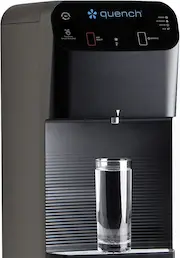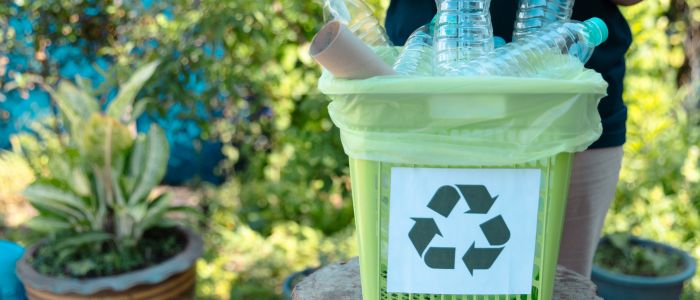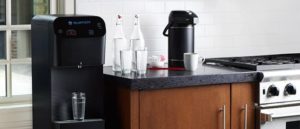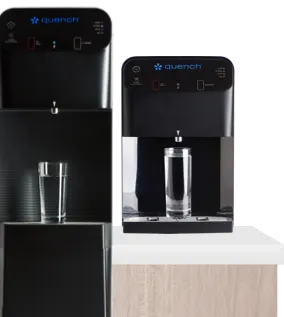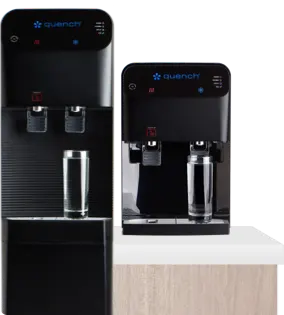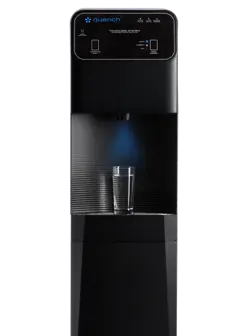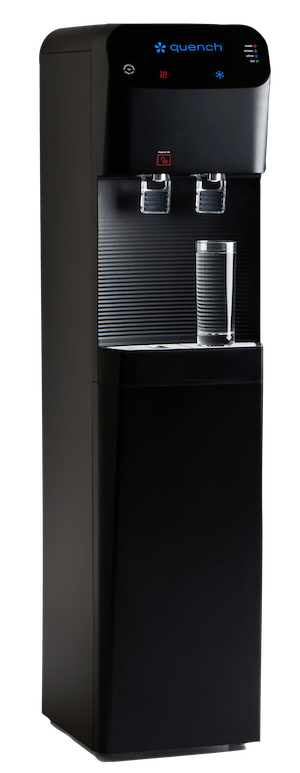UPDATED ON: APRIL 15, 2024
As plastic waste continues to grow and proper management becomes more urgent, everyone must explore ways to adopt eco-friendly habits. People across various settings are now prioritizing reducing the use of single-use plastics. If you’re looking to make sustainable changes in your daily routine, we’ve gathered advice from our Quench Water Experts on how you can cut down on water bottle waste by practicing simple strategies to reduce, reuse, and recycle.
The Importance of Environmental Protection Efforts
For more than 50 years, global production and consumption of plastics (e.g., food and beverage containers, plastic bags, bubble wrap, and more) have continued to rise, and the trend is expected to continue. In fact, the Organisation for Economic Co-operation and Development reports that the amount of plastic waste produced globally is on track to almost triple by 2060. This uptick can be attributed to plastics’ attractive qualities:
- Versatile
- Lightweight
- Strong
- Moisture-resistant
- Relatively inexpensive
However, plastic materials are durable and very slow to degrade — ultimately becoming waste with staying power. Today, environmentalists are referring to the global plastic pollution problem as an epidemic because of its persistence.
Between bottles, bags, and plastic packaging, it’s easy to quickly accumulate a significant amount of plastic materials. For reference, Grand View Research notes the average person uses 156 plastic bottles each year, with Americans throwing away 2.5 million plastic bottles every hour, according to Recycle Across America. Although these bottles are recyclables, they have overall recycling rates of 29.1% and 29.3%, respectively.
Why Recycle?
Given the increasing global plastic crisis, both homes and workplaces need to ramp up efforts in recycling plastic bottles and explore ways to reduce and reuse them. Why? Plastic bottles contribute significantly to pollution and landfill waste, taking hundreds of years to decompose and releasing harmful toxins into the environment during the process.
Recycling reduces the demand for plastic production, conserves natural resources, and minimizes energy consumption associated with manufacturing new bottles. Plus, it helps to prevent plastic pollution in oceans and waterways, safeguarding marine life and ecosystems.
Ultimately, intentionally focusing and improving efforts on recycling plastic bottles not only mitigates environmental harm but also fosters a culture of sustainability and responsible consumption.
How To Recycle Plastic Bottles at Home and Work
Bottled water production and consumption are a detriment to environmental protection. While global plastic waste is anticipated to triple, less than half gets recycled — the process of collecting and processing materials that would otherwise be thrown away as trash and turning them into new products. This means the majority of plastic waste ends up in our waterways and landfills. By recycling plastic water bottles, you’re eliminating the need for additional plastic to be produced.
According to a joint survey conducted by the World Economic Forum, SAP, and Qualtrics, 94% of Americans support recycling, and 74% say it should be a top priority. However, only about 35% of people actually recycle. What’s stopping people from carrying out this goal? Americans cite the main barrier to regular recycling as a lack of convenient access.
Fortunately, there are a few easy ways to improve your recycling game:
Improve Your Recycling System
Enhancing your recycling system at home or work is simple. For households, set up designated recycling bins for easy sorting and make sure they’re easily accessible to all members of your home. It’s best practice to flatten cardboard boxes and rinse containers before recycling. Workplaces, on the other hand, should place recycling bins in common areas to boost accessibility. What’s more, teams can educate employees on proper recycling practices, introduce incentive programs, or consider partnering with local recycling programs to improve their initiatives.
Whether in a residence or workplace, encouraging proper sorting and making recycling convenient creates a more effective and impactful recycling system for everyone involved.
Consider the following tips for plastic bottle and jug recycling preparation:
- Empty and rinse: Before recycling, empty plastic bottles and jugs of any remaining liquid or contents, and rinse them thoroughly to remove any residue.
- Remove caps and labels: Caps are often made from a different type of plastic and can interfere with the recycling process if left on. Labels can also cause issues, so it’s best to remove them beforehand.
- Crush or flatten: Consider crushing or flattening plastic bottles and jugs to save space and make transportation more efficient. This also helps recycling facilities process the materials more effectively.
- Separate by type: Sort plastic bottles and jugs by their resin identification code (usually found on the bottom) to ensure proper recycling. Different types of plastic may require different recycling processes, so separating them can help streamline the recycling process.
- Use clear bags or bins: Place rinsed and sorted plastic bottles and jugs in clear bags or bins designated specifically for recycling. Clear bags or bins make it easier for recycling collectors to identify and separate recyclable materials.
Repurpose Recycled Material
For a practical recycling strategy, households might repurpose cleaned bottles as organizers for small items like craft supplies or pantry goods. In workplaces, consider using larger recycled bottles as storage containers for stationery or small tools. Be sure to label the bottles for easy identification. This dual-purpose strategy stimulates a circular approach to plastic consumption and effectively promotes sustainable practices in daily routines and professional settings.
Work With Waste Management Companies
To ensure your recycled plastic bottles make it where they’re supposed to go, you can collaborate with waste management companies. Homes can schedule regular pickups or drop-offs at recycling centers nearby, for example. Workplaces also considerably strengthen sustainability initiatives by partnering with waste management teams and offering specialized recycling programs. This streamlines the recycling process for more efficient plastic disposal in the long run.
Keep in mind that not all products can be recycled. If you’re not sure about a product or material, here’s a list of items you can typically recycle:
- Paper
- Cardboard
- Food Boxes
- Beverage Cans
- Food Cans
- Glass Bottles
- Jars (Glass & Plastic)
- Jugs
- Plastic Bottles and Caps
Ways To Reduce and Reuse Plastic Bottles
Recycling isn’t the only way to minimize your environmental footprint. Reducing your use of plastic bottles offers an alternatively powerful means to improve your eco-friendly efforts. Minimizing consumption not only minimizes waste but also contributes to a more sustainable future. When you think about recycling and reducing plastic bottle use, you might wonder about reusing them too. We’re exploring both further below:
How to Reduce Plastic Bottle Use
The most effective way to reduce waste is to not create it in the first place. Making a new product requires a lot of materials and energy. In one year, the manufacturing of plastic water bottles burns about 6 million gallons of fuel and releases approximately 2.5 million tons of carbon dioxide into the atmosphere. So, even when recycling plastic beverage bottles, the initial production of the products has already hurt the environment.
To mitigate plastic pollution, you can:
- Encourage reusable water bottles: Make the switch to durable, refillable water bottles to reduce your reliance on single-use plastics and minimize waste generation. Research from Earth Day reveals that you could save an average of 156 plastic bottles annually by using a reusable water bottle.
- Promote tap water: Tap water goes through municipal treatment to ensure it’s safe to drink. Emphasizing the safety and quality of tap water at work or home fosters confidence in the water sources available, helping to reduce dependence on bottled water.
- Educate and raise awareness: Taking steps to make sure everyone in your household or workplace recognizes the true environmental impact of plastic bottles empowers individuals to make informed choices and adopt more sustainable practices.
- Opt for a bottleless water cooler: You can limit water consumption from a single-use plastic water bottle or a 5-gallon plastic water jug by introducing a bottleless water cooler. This provides convenient access to clean, filtered water to reduce plastic waste generation and environmental harm.
Can You Reuse Plastic Water Bottles?
Once a product is produced — and the environmental impact of manufacturing that product has already culminated — the next best way to reduce waste is to reuse the product. However, some products like single-use plastic water bottles might not be safely reusable. Why? This is because disposable water bottles can be made of bisphenol A (BPA). BPA is an industrial chemical added to plastic to make it stronger and according to Environmental Research, this has been linked to:
- Liver and prostate cancer
- Heart disease
- Cognitive problems
- Asthma
- Diabetes
Moreover, chemicals can leach from the recycled bottles into the water if they are subjected to heat. Because of this, experts don’t recommend refilling single-use plastic water bottles. Luckily, in pursuit of reusable options that won’t impact your health, there are safe alternatives to consider, including:
- BPA-free plastic reusable bottles
- Aluminum reusable water bottles
- Glass bottles
Answering Plastic Bottle Recycling FAQs
What happens to plastic bottles after they’re collected for recycling?
After plastic bottles are collected for recycling, they undergo a process of sorting, cleaning, and processing at recycling facilities:
- First, they’re sorted by type and color.
- Then, they are cleaned to remove any remaining residue or contaminants.
- Next, the bottles are shredded into small pieces and melted down to form pellets or flakes. These pellets can then be used to manufacture a variety of products, including new plastic bottles, containers, textiles, and construction materials.
Are all types of plastic bottles recyclable?
While not all types of plastic bottles are recyclable, the most commonly used ones, such as PET (Polyethylene terephthalate) and HDPE (High-density polyethylene), are widely accepted by recycling facilities. Remember, you can always check your local recycling guidelines to ensure proper disposal.
How can I find out where to recycle plastic bottles in my area?
To find out where to recycle plastic bottles in your area, contact your local municipality or waste management department. They can generally provide more specific information on recycling drop-off locations, curbside pickup schedules, and any special instructions for recycling plastic bottles.
Is there a limit to how many times plastic bottles can be recycled?
There’s no specific limit to how many times plastic bottles can be recycled. However, each time plastic is recycled, it may degrade slightly, affecting its quality and properties. Fortunately, advancements in recycling technologies and processes have made it possible to recycle plastic bottles multiple times without significant loss of quality.
Are there any alternative uses for recycled plastic bottles besides making new bottles?
Besides making new bottles, recycled plastic bottles can be used for manufacturing clothing, furniture, automotive parts, packaging materials, and even construction materials like plastic lumber and composite decking. Repurposing recycled plastic bottles into these products helps reduce waste and promotes a circular economy.
Promoting Sustainability With a Bottleless Water Dispenser
To considerably reduce plastic waste, you can stop using single-use plastic bottles or 5-gallon plastic water jugs and make the switch to a Quench filtered water cooler for clean, great-tasting drinking water that will positively impact the planet today and every day.
A bottleless dispenser from Quench — or a point-of-use (POU) water cooler — connects directly to a building’s existing water line and delivers water straight from the municipal tap water supply. This water has been filtered and then chilled or heated within the water cooler. Some point-of-use water coolers can even dispense sparkling, flavored water, or ice.
Bottleless water coolers differ greatly from a traditional, 5-gallon water cooler in that the water is filtered on-site rather than pre-filtered and bottled at an off-site manufacturing plant and then delivered to a business. This minimizes plastic water bottle waste and cuts down on the pollution linked to producing and distributing plastic bottles or delivering 5-gallon bottles, which includes emissions like carbon dioxide and nitrogen oxide from delivery trucks.
Although water jug delivery services encourage customers to return their plastic bottles so that they can inspect, clean, sanitize, and refill them for reuse, they can only be refilled an average of 40 times before needing to be discarded. Ideally, these plastic bottles would be recycled, but studies show that less than 30% of plastic beverage bottles purchased in the U.S. are recycled each year, and only about 70% of the plastic material can be used in the recycling process. To better visualize the amount of plastic that gets recycled each year, check out the line graph below from the EPA.
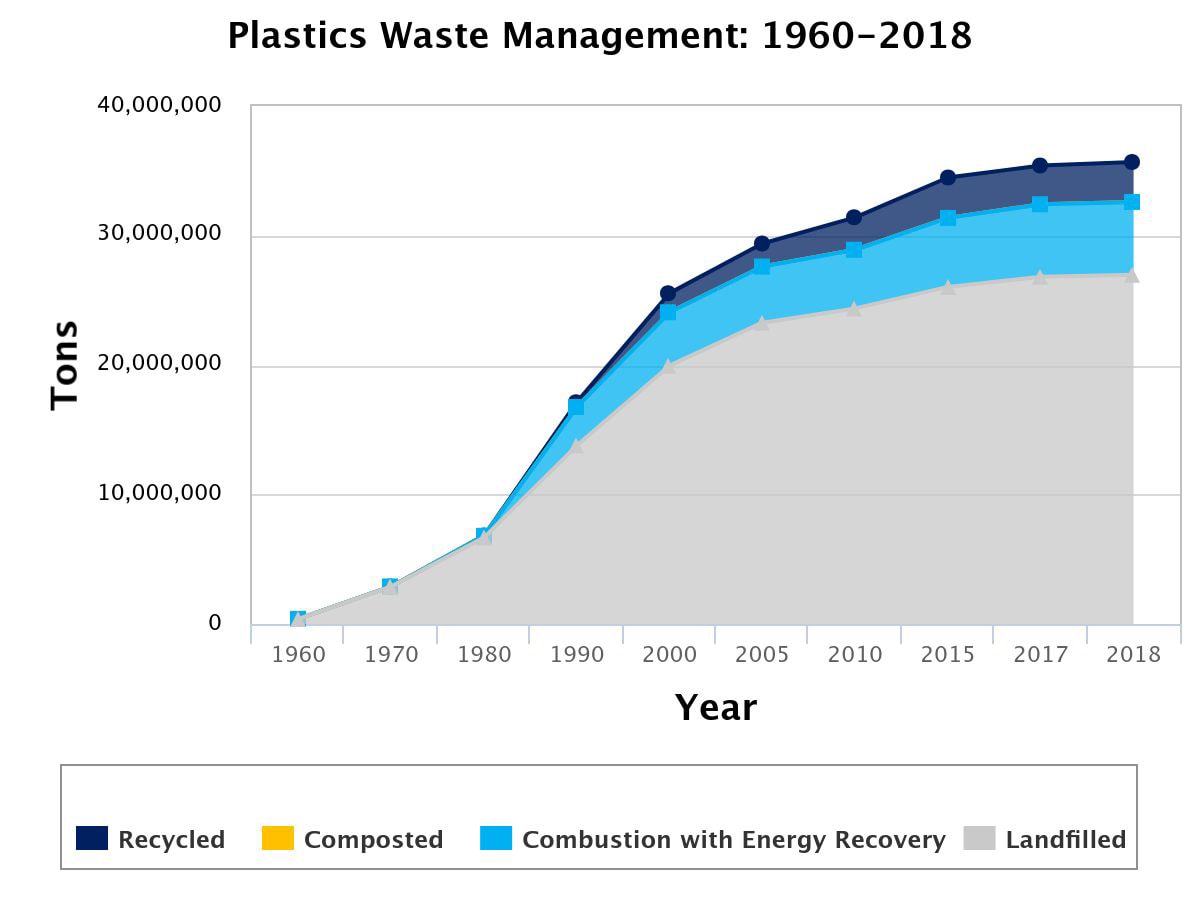
Source: www.epa.gov
Our Mission at Quench
As we reach a record amount of pollution on our planet, we each need to do our part to help save the environment that we all know and love. At Quench, enhancing the sustainability efforts of our customers is a core value of our service. We help our customers eliminate the use of bottled drinking water delivery services and the incumbent fossil fuel depletion, carbon emissions, and additional plastic waste by filtering a building’s existing water supply at the point of use via a bottleless water cooler.
A standard Quench water cooler prevents approximately 150 five-gallon plastic water jugs from ending up in landfills and waterways each year and reduces all the associated production and transportation pollution. By opting for a Quench water cooler in your home or business, you’re taking the next step in daily sustainability. To learn more about our commitment to eco-friendly initiatives, check out our Environmental Sustainability Mission Statement.
If you’re ready for more environmentally friendly drinking water solutions, try our product finder to get matched with your ideal machine, or get a free estimate today.
